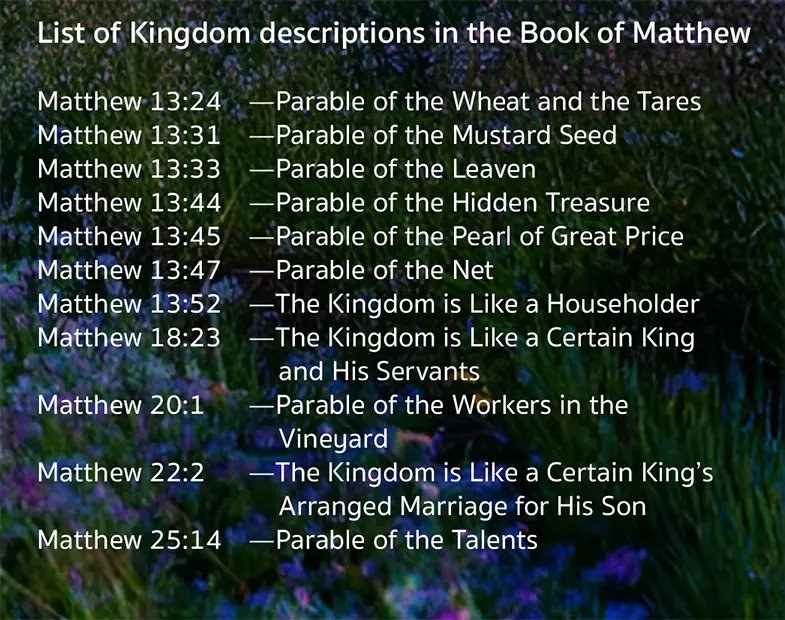
Are you consuming what the world has to offer, filling your mind with its knowledge and systems, or eating from the Tree of Life with the word of God and divine operations? And how does this pertain to the mind of Christ? You will find no reference in the Bible where Jesus ate from the tree of knowledge of good and evil, the world’s systems and comprehension. He continually spoke of His Kingdom and how it operates through relatable stories, instructions, and parables, only revealing the truth behind some mysteries to those closest to Him and who believed He was the Messiah. He showed His displeasure with the system and man’s understanding when He entered the Temple and not only flipped the tables but patiently braided a whip to use, thus revealing how corrupt it had become and His patience. The people were consuming, changing money with the wrong fruit from the wrong tree, and He had had enough of it. To learn what the mind of Christ is, we need to read the Bible and be filled with the Holy Spirit. The Bible is the knowledge of the Law unto repentance and the Gospel of Truth, the revelation of Jesus Christ and His works. The Holy Spirit, the Spirit of Truth, resided in Him, and He completed the Law of Moses. He died to become our Sabbath. He rose again to leave us with the Holy Spirit to navigate the world’s corruption and occupy us until He returns in power and great glory, this time with a sword. He did not die in vain, and those who are found to be mindless consumers of the fallen prince’s dainties (delicacies often associated with temptation or indulgence. See Proverbs 23:3, Psalm 141:4, Daniel 1:8), eating from his table and not consuming the body of Christ, will be judged accordingly.
Forasmuch then as Christ hath suffered for us in the flesh, arm yourselves likewise with the same mind: for he that hath suffered in the flesh hath ceased from sin; That he no longer should live the rest of his time in the flesh to the lusts of men, but to the will of God. 1 Peter 4:1-2 (KJV)

Jesus’ first miracle was intimate. It was only shared with those in attendance at the wedding at Cana (see John 2:1-11) when He turned the water into wine. His name became well known as His mission continued, with miracles such as casting out evil spirits, healing and feeding thousands, and providing for the Temple Tax inside the mouth of a fish. The Book of Matthew (see list) records many teachings about what the Heavenly system looks like and how it operates. Still, even after His fame outgrew the small and intimate settings, He only revealed explanations to His disciples and those closest to Him. However, Jesus also uses the phrase, “He who has ears to hear, let him hear” throughout His teachings. In Mark 4:1-20, He spoke to a multitude about the Parable of the Sower. Everyone has ears, so what is meant by this? Everyone may have physical ears, but only those who believe in Him and are filled with the Holy Spirit will have “spiritual ears” to understand what is meant. When they were alone, those who followed Him and the twelve disciples asked Him to explain the Parable of the Sower (see Mark 4:10). Those in an intimate setting with Him received, not the multitude. They were eating His Words, His Body, and the Mind of Christ for their nourishment. At the very first miracle at Cana (which means place of the reeds), the water of the world was made into the wine of Heaven, symbolizing His blood, brought forth by the Son of Man who would shed it and become the Sabbath for Man (see Mark 2:27).
Jesus answered, “My kingdom is not of this world. If My kingdom were of this world, My servants would fight, so that I should not be delivered to the Jews; but now My kingdom is not from here.” John 18:36 (NKJV)
Did you know that John chapter two begins with the story of the first miracle of water to wine in Cana and proceeds directly into the story of overthrowing the tables in the temple? After the wedding, Jesus, his mother, brothers, and disciples went down to Capernaum for a few days, then went to Jerusalem for the Passover. And what did He see in the temple? He found people selling oxen, sheep, and doves, and the money changers were sitting in opposition to His Father’s will. Observing them, He made a whip from twisted reeds. He forcefully drove them all out of the temple, scattering the money changers’ coins and overturning the tables.
He said to those who sold doves, “Take these things away. Don’t make my Father’s house a house of merchandise.” Merchandise is the Greek word emporion, where we get the word emporium. It means a significant trading center where foreign traders engage in commerce in a country or region. From the original text, we can extract that this statement would be plausible: “Don’t be in opposition to the Father and make the house of God a place where foreign traders can engage in commerce. Take these things from this place, from within His house, to a place of rest. Don’t make God’s dwelling place a place where trade is carried out; it should be a place of rest.” What is intriguing is that the word emporium is also an obsolete word for the brain, the central hub of a man’s spirit. It is the storehouse of spiritual information, such as thoughts, decisions, and memories. It is the central command unit for all processes in the human body, including accessing the Holy Spirit. And we are commanded to renew our mind (see Romans 12:2) and have the Mind of Christ (see 1 Corinthians 2:16; Philippians 2:5). We can without question know and believe that Jesus drove out all of the trespassers from God’s temple and made a way for us to benefit by doing the same with those trying to do business in our minds. We are also commanded to cast them down, just as He did (See 2 Corinthians 10:5), having faith in what He did in the temple!
Mind of Christ
Jesus sacrificed His life to give us grace, and we should accept this truth: His death was not meaningless. If we could be saved by keeping Jewish laws, there would have been no need for Him to die (see Galatians 2:21). The Law was given so transgression would increase until the Seed of the Promise arrived. Righteousness can never be achieved through the Law, only through His blood-bought grace. However, we can’t be mindless consumers, eating up every little jot and tittle of knowledge from every modality the world offers us. Our lives, especially our minds, have been consumed by endless words cursing us, disguised as life-giving when they only place before us death and the consumption of the wrong tree. Then there is scrolling our phones, entertainment, and busy work to the point it is overwhelming many. Computers and technology may have started out being promoted as a “time-saver,” “money-saver,” or “money-maker.” Yet, it has become a “time-killer,” “money-taker,” and a table full of the fallen prince’s dainties. It is true that where evil abounds, grace much more abounds, and His mercy will always supersede wickedness, so we better look to what God says about a thing or ask the Holy Spirit for guidance. Everything coming at us is not surprising to God, and we must remain stewards while He tarries. But how can we operate in this system? Matthew 6:9-13 gives us the prayer we all need to pray, what we call the “The Lord’s Prayer.” (See inset with notation)
The Lord’s Prayer
Matthew 6:9-13 (KJV)
After this manner therefore pray ye:
Our Father which art in heaven, Hallowed be thy name.
Thy kingdom come,
Thy will be done in earth,
as it is in heaven.
Give us this day our daily bread.
And forgive us our debts [trespasses], as we forgive our debtors [those who trespass against us]
And lead us not into temptation,
but deliver us from evil:
For thine is the kingdom, and the power, and the glory, for ever.
Amen.
The KJV edition and others use debts and debtors; however, what I learned as a child, and still use today, is the word trespass. Historically, the Tyndale Bible (1526) used trespass for its translation, as did the 1549 Book of Common Prayer. In the context of this article, we must forgive those who are trespassing against us, coming against our minds, and pulling our focus from the Lord so that we may also be forgiven. Renewing our minds daily allows us to grow closer to Him and place a more substantial barrier between us and the world’s illusion of prosperity and what we should consume.
Herein lies the hope of Christ and the infilling of the Holy Spirit–our helper. The renewal of our minds–our storehouses–relies on our relationships with Him and belief in His words and finished works. Are you renewing your mind to His words so that He has your heart, or does someone else?
CONCLUSION
Which table, The King’s or the fallen prince’s, will you be dining at tonight, and whose wine will you be drinking?
Jesus manifested His glory, and He made known at Cana that His Kingdom system, at His pleasure, could literally take H2O, by His glory and words, and change the molecular structure into something that had been planted, grown, harvested, pressed, fermented, aged, clarified, and placed in an earthen vessel, just like Him. He had mastery of all systems because all things were made by Him (see Colossians 1:16).
We are the temple of the Holy Spirit–God’s dwelling place (see 1 Corinthians 6:19-20; 1 Corinthians 3:16-17). He lives in you and me; we are no longer our own. The psalmist asked, “Who is man that you are mindful of him? And the son of man, that you visit him? For you have made him a little lower than the angels (the word Elohim here can also be translated as God), and have crowned him with glory and honor” (see Psalm 8). Who’s glory? Who’s honor? The LORD’S.
Doesn’t that sound exactly like the wedding story at Cana? The servants filled the purified stone vessels with water to overflow, representing the infilling of the Holy Spirit. However, the glory of the Lord, His headship, the Mind of Christ, brought forth the transformative power to change the water in the vessel to wine. That mind is in us under Christ’s authority and power. Yet, we must keep it flowing with the ever-living fountain from His Word and the Holy Spirit. Don’t be a stone in the middle of the river blocking the flow!
The psalmist continues and declares man has dominion over the works of His hand, placing all things under his feet, including the sheep and oxen, beast of the field, fowls of the air, and fish of the sea. Well, well (pun intended), that sounds an awful lot like what the outcome from Jesus Christ patiently waiting, braiding a whip, and driving out the money changers and trespassers from the Holy Temple would be!
Our minds need to understand that we are His handiwork. We do house the Spirit of God. We can operate in the glory and honor bestowed upon us. We do have dominion over our situations. We can lean on and trust that His Name, His position, His reputation, and His authority are mighty and above all kings, nations, and gods. The Name above all names. We are His children, and we shall see the glory of the Lord in the land of the living, not someday, but this day–the day the Lord has made!
Feature Image: Willow tree at stream GENAI Text to Image; Scripture quotations marked KJV are taken from the KING JAMES VERSION of the Bible.; Scripture quotations marked NKJV are taken from the New King James Version®. Copyright © 1982 by Thomas Nelson. Used by permission. All rights reserved.



